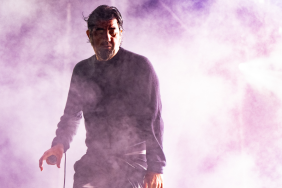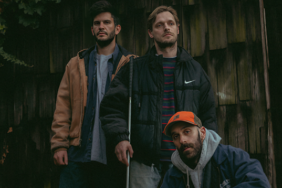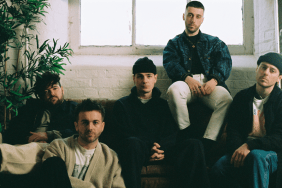Since forming in 1988, Tortoise have slowly built themselves an enviable reputation as one of the world’s leading avant garde rock bands. With a few line-up changes here and there and more side projects than you can poke any number of sticks at, the band have always pushed themselves forward as musicians, making use of one of the most varied arsenals of instruments outside of Godspeed You! Black Emperor.
Their latest album Beacons Of Ancestorship, however, sees the band adopting what you might call a more minimal approach to instrumentation, choosing to use synths rather than Vibraphones or what have you to wreak their sonic havoc on our eager ears. The result is probably the hardest sounding record in the band’s catalog.
Set to touch down on stage at Manning Bar this Saturday 9th May as part of their Australian tour in support of the new album, we caught up with guitarist Jeff Parker to talk about the band’s new direction, how working on other projects keeps their ideas fresh as well as how it’s the pressure the band put on themselves to innovate and evolve that inspires them to keep going 22 years later.
Music Feeds: So first off I wanted to talk to you about the latest album. You guys are always pushing the boundaries of your sound, how does this album differ from what’s come before?
Jeff Parker: Well obviously we made the decision to leave the mallets off of the album, and that sonically makes it a lot tougher sounding record in terms of production; there are a lot of dirtier sounds and it’s louder. So in those ways it’s completely different and completely new for Tortoise. I mean, we’ve all done work with other people that was a lot harder and heavier I would say, but at least within the context of Tortoise it’s something different.
MF: So would you say you’ve all brought together ideas from the work you’ve done with the other side projects?
JP: I would say that the album is indicative of what individual members of Tortoise were dealing with in the interim period between our former and our current album. I don’t know if you’re familiar with all of our side projects, but Dan Bitney, John Herndon and John McEntire released a record of drum breaks for Stonesthrow called Bump, and otherwise individually a lot of us were making music on our own that was more beat oriented. But yeah there was definitely a lot happening around that time that influenced the direction we took with the album.
MF: Was there any particular reason why you chose to use synths on this album and ditch the mallet instruments?
JP: Man I don’t know, you know, I don’t know any deliberate reasons. I mean they’re convenient for one (laughs). There are a few things we consider when we start to make a new album, like somebody in the band might be like ‘I just want to play like these instruments that I’m interested in for this record’, and Johny Herndon has a Moog Voyager, and that’s kind of his instrument in the band, the Moog and the drums, that’s kind of all he plays right now, and once somebody in the group makes a conscious decision to do that, as opposed to embracing like a full arsenal of instruments which we might have in the studio, which could include everything from a saxophone to a harpsichord and all kinds of stuff we have access to, but once we start putting limits on what we’re going to do when we record that kind of dictates the whole flavour of the album. That’s pretty much what happens.
MF: Cool, so does that mean you guys aren’t going to be bringing the vibraphone out to Australia?
JP: Nah, we’ve got it. We need it to play the old songs.
MF: So you’re not going to replace it with sampler or backing tracks or whatever?
JP: Not right now. I don’t know if you ever saw Tortoise back in the way old days, but basically like ten years ago we had a vibraphone and a marimba. We would have to rent them when we travelled or we would have to lug our own around, but now we have like a Midi controller but you play it with mallets. So we can trigger samples with somebody playing mallets so we’ve also sampled the marimba and so we don’t carry the marimba around anymore. It could happen with vibes, but it’s a bit more difficult, cos you’ve got the sustain pedal and you need to be able to control the instrument in that way as well, but it could happen. It’s definitely something we’ve considered.
MF: Yeah, well it seems that as a band you guys don’t like to sit still, you’re always looking for a new direction or sound.
JP: Yeah, I would say that’s fair man. I’m not necessarily sure why, and to be honest, I mean man you have to understand, I’m still the newest member of Tortoise, and I’ve been a member since 1997. I mean I was a fan of Tortoise before I joined, so I like the old stuff, but those guys have been dealing with that stuff since the beginning and they’re like ‘man we don’t want to do that shit anymore’ and I’m like man… I mean I like the new stuff but I also like the old stuff and me personally I would like to get back into some of the more soft and pretty sounding Tortoise music, and mix it with the new more rock stuff, but I’m not sure if that will happen. I can’t speak for all the other guys in the band.
MF: Cool. What was that like though, having to join an already pretty well established band as the new guitarist?
JP: Yeah man it was, it was a challenge cos you know I mean they added me to the band as a guitarist. I can do whatever I want but everybody in the band, even though we swap instruments, everybody sort of has one main instrument that they play, and when I saw the band play for the first time it was basically three drummers and two bass players and they had a sound that they were dealing with and it was basically percussion and bass, and I was really careful not to disrupt what they already had. I was trying to fit in, but not really play like a normal guitar player. I don’t know, it was challenging, and it still is you know, it’s not any less challenging now.
MF: Would you say it’s the challenge that keeps the band going?
JP: The person I was talking to before you, I was telling them how it doesn’t get any easier to make the music with Tortoise. We kind of put pressure on ourselves to come up with something new, just to keep the band interesting for us. I mean none of us are in the band are the type of people to sit back and rest on our laurels; we want to keep moving this thing that we created forward. Honestly if it felt like it was stagnating, we probably we wouldn’t do it anymore.
MF: You all work with other side projects, would you say that being able to go off and be creative in a different environment helps you stay inspired?
JP: Yeah that’s true, but I mean it’s weird to even call the other stuff side projects. We invest fully in all the stuff we’re involved in, but I guess on a professional level Tortoise takes precedent because obviously the band has somewhat of a reputation and a fan base. Of course that then means we get more opportunities than a lot of the other stuff and we’re forced to prioritise it in a way. But we’re all musicians, it’s kind of what we do all the time and you know, every experience you have, you learn from it and you bring it back with you to whatever it is you’re doing.
Tortoise play the Manning Bar this Saturday 9th May. Click here for tickets.












